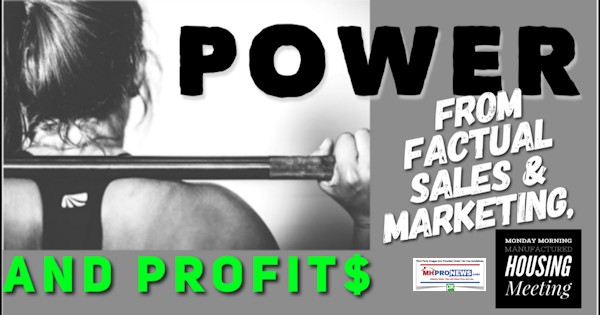
It would be hard to find a business or a business professional that would argue against more good sales or higher profits.
It would be harder still to find a professional or investor that would argue against more sales and higher profits achieved with happy customers, and high CSI.
CSI is a customer satisfaction index. It’s an internal or third-party measure of the satisfaction level of a customer. Ideally, a CSI is factual.
Ideally, we should use facts – not hype or exaggeration – as the basis for everything in business, including sales and marketing.

There are literally millions of Americans who are checking out HUD Code manufactured homes every year. They might be using Google, Bing, or Yahoo to search for “mobile home,” “trailer house,” “modular home” or whatever.
Facts are facts. Too many let emotions, ego, habits (‘We’ve always done it this way‘), company politics, fear of change, or other factors get in the way of higher sales and profits. Forget all that emotional baggage, because it is demonstrably costing you/your location(s) money.
To a clear-minded professional who can look at data dispassionately, facts can speak loudly. Properly understood, facts can drive more leads and more sales.
We live in an era when information is easily accessed. Tens of millions can use mobile devices to search for information. Millions more will use a desktop or laptop for internet searches.
As millions in the U.S. or elsewhere search for a product or a service, what is it that they most want to discover?
The truth. They want “the Facts.”
Some will make a snap judgement. Right or wrong, that decision may take only a few seconds. So it isn’t as if emotion or pretty pictures don’t play a role in the equation. Of course they do.
But if pretty pictures or slick videos alone were the answer, then thousands of locations – retailers and communities – from coast to coast would have customers lined up at the doors every day to buy.
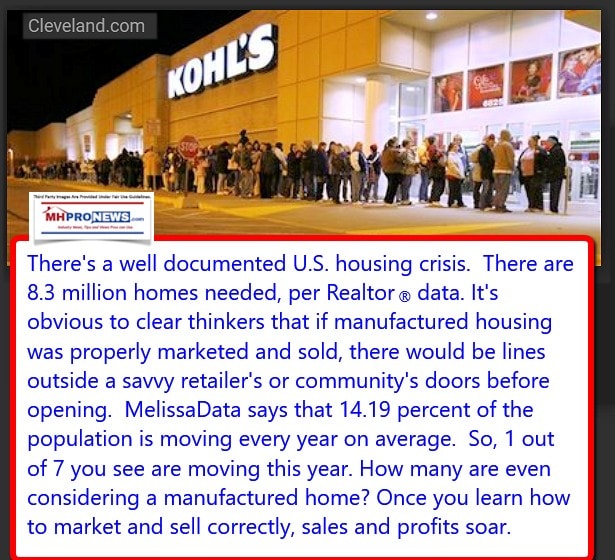
But facts can – indeed, they must – be used as the basis for all honest and ethical persuasion IF good results are to be sustainable. I’m not saying that manufactured housing is fooling anyone, those who know us know that we are true believers in the industry’s products and services.
But until more of the home seeking public believes in manufactured homes in greater numbers – or is at a minimum, is curious enough to come and see manufactured homes in person – sales will stay modest.
Furthermore, until more home shoppers have an experience that gives them a similar level of confidence as they get in the real estate business, sales will stay modest.
Experience Shows…
I’ve professionally visited corporate and independent retail and communities over the years than I care to count. In my working with various independent and corporate manufactured home retailers and communities for over 15 years, a few things are clear.
1) A significant number of locations can have good traffic, but low conversions as measured by visitors to sales.
2) An even greater percentage of people who surf a site fail to convert into an active lead, or smaller still, into an actual buyer.
3) By using a combination of facts and emotional appeals correctly, traffic can grow, and so can conversion ratios.
4) Rephrased, for those willing to invest in change, and stick with it, you’ll find more sales, more profits and higher levels of customer satisfaction. Those happy customers can bring you still more buyers.
5) Some, of course, have low traffic. That can be fixed fairly quickly.
6) Side note, for communities that rent and sell, you’re losing millions of dollars a year in sales. I get the profits possible from rental units. I get it that it is easier to rent than sell. But there’s also beauty and profits possible in the original model for MHCommunities, and that can still be achieved by selling more manufactured homes on leased land.
Is their Evidence for Factual Based Marketing and Sales?
Let’s answer the question immediately above with one word. Absolutely.
We will start by offering as proof MHVillage’s (MHV) published statistics. Keep in mind, we are not slamming them, nor are we putting them down. This is clinical look, like an analogy to an examination by a doctor or accountant.
MHV are understandably proud of their data, which is why they publish it, right?
But what the MHVillage data and their own claims tell discerning and savvy marketers is this. Millions check out manufactured homes online every year. But in 2017, only some 92,900 actually bought a new manufactured home. That’s a sad conversion ratio. It’s also one that screams that it can be dramatically improved. The goal isn’t an unachievable perfection. Rather, its a sustainable level of improvements that drive more sales, and thus, higher profits.
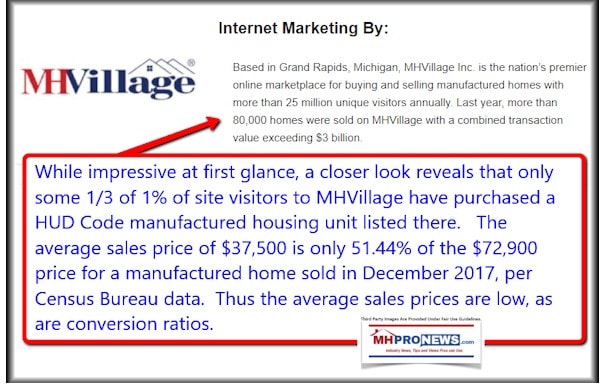
Again, let’s use data – facts as proof. By contrast to MH data, the RV industry way outsells MH. But do you realize that MH outsold RVs just 20 years ago? What caused the shift? How did RVs go from trailing MH to outselling MH by almost 5 to 1?
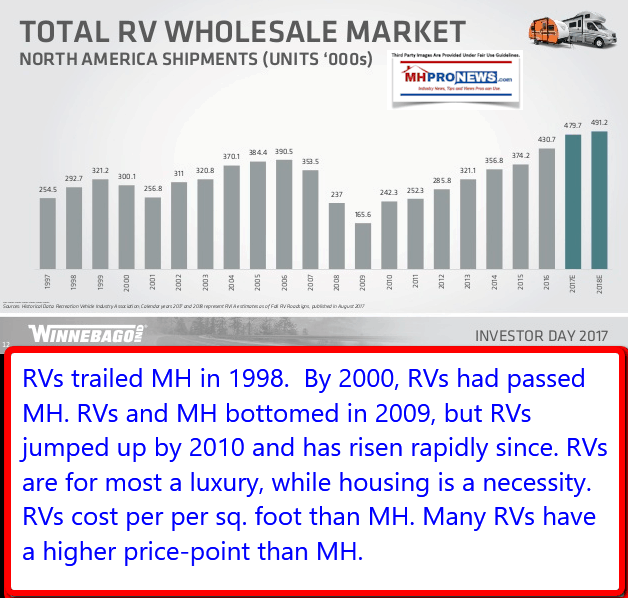
What RV Industry’s 2018, Prior Results Reveal for Manufactured Housing
Going back to the MHVillage data. Less than a fraction of a single percent converted to buying. In my discussions with those in real estate, they experience a far better conversion ratio than manufactured housing professionals achieve.
These facts are opportunities in disguise. MH is different than real estate or RVs. But there are lessons to be learned from those industry, by our industry. Few if any have studied and successfully applied these lessons than this writer.
Clayton Trainee’s Praise – Low Hanging Fruit vs. Choice Fruit
A newbie to Clayton Homes recently told us about their sales training. That person, who has prior sales experience, rated the Clayton training as “excellent.”
Ok, let’s factually examine that for a moment.
If Clayton Homes’ retail – or their marketing – had a total grasp of what works and what doesn’t, then answer this question. Why have they had to close a net of about 100 retail centers in the last 7 years? See the article, linked below. And ICYMI, if you aren’t already on our free email list, you can sign up in seconds, at this link here.
The data – plus what industry pros in big and small companies tell us – is this.
Most operations, no matter how disciplined they may be at a factory or a finance office, lack a similar level of discipline in retail and marketing. Their own data says so. My eyes and ears have told me so.
As a cross check, when I talk to lender’s reps – who visit sales centers – and who’ve been in the business for around 20 years, they see that same pattern too.
But don’t take my word for it. The proof is in Clayton’s and MHVillage’s own data. Again, this isn’t a slam on those in MH sales or marketing. Management accepts what is, or things would be different.
Let me tell you, many sales pros WANT to be properly trained. If they are on commission, a motivated sales pro, WANTs to sell more homes.
We always begin with those in place. It may be easier and better to get them to learn something new.
Or sometimes we work with management to bring in one or two new people. We teach them the new ways. Once they start to catch or outsell seasoned veterans, and you’ll rapidly have a motivated experienced sales person saying, ‘okay, I’m ready to learn more.’
Management and sales can and should help each other. BTW, we would rather work with an existing marketer, teach them a few new principles, and let them get motivated about delivering better results that they’ll get for their company or clients.
Facts Matter, Understanding Customers, and Industry Dynamics Matters
There are a number of things we do on the consulting side of our operations that are proprietary. We keep client information confidential, and client’s commit to doing that with us too, both for obvious reasons. We may talk about generic or obviously non-proprietary data.
But we only publish specific client results when we mutually agree to do so.
That said, when clients gladly praise our results, and those that observed those results praise the work, that’s what prudent, discerning minds should ponder. As always, facts matter.
Consultants get paid for doing things that a company can’t easily do for itself.

Consultants also get paid for doing those things that would speed up a process that a company might do on its own – but for whatever reasons, has up until that time failed to achieve. Or another reason why consultants or outside service providers are used is when it would cost more to do that contracted work internally than it would externally.
Consultants and contract service providers also get paid to observe. I’ve seen for myself very successful sales centers with low conversion ratios. Part of the reason is that too many target – wittingly or not – “low hanging fruit.”
Let me give just one example. When a successful retailer tells me it is hard to find customers applying at their sales center with credit scores over 600 or 625, that’s an example of attracting and/or selling to low hanging fruit.
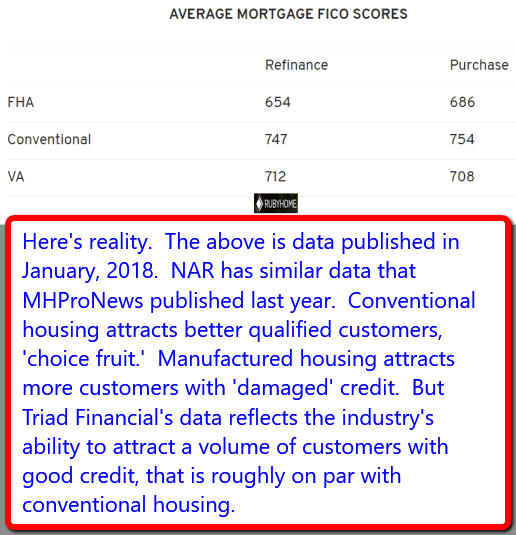
Everyone in America deserves an opportunity for home ownership. It’s an outrage that about 40 other nations have a higher rate of home ownership than the USA does.
This writer, always working with others, has taken previously failing locations and made them successful.

We did that for a Clayton Homes location, some years ago. But even after Clayton saw the proof of rapidly rising sales with their own eyes, they somehow didn’t get it. Once my work at that location ended, they went back to their previous ways. Why? Perhaps someone somewhere in their food-chain didn’t want to change something that they liked?
But the point is, a Clayton store slated for closure, due to low sales and negative profits, was rapidly turned around into a money maker.
But even after those positive changes at a Clayton retail location were implemented, when I left that location, others that followed obviously undid them.
It isn’t just Clayton. I’m being clinical, and not ‘picking’ on them. Facts are facts.
For a different example, I did a gig with a major community operator, prior to our launching MHProNews. We took a closed sales center. It has been closed by this big operation because of poor sales. We reopened it for them, and rapidly got it turning new home sales.
Their home office was so impressed, their top people came to see first hand, and ask, ‘what are you doing that’s working so well?’
Your’s truly had a hearty conversation with some of that portfolio operations top brass. At the end of that conversation, the top man, with his colleagues present, said words to this effect. ‘We’re a publicly traded company. It isn’t easy for us to make the kinds of changes that you propose.’
First of all, they came to talk to me, I didn’t call them. They asked, I answered. And for whatever reason, even after seeing the profitable results, they wanted to go back to their old ways. Interesting, isn’t it?
By the way…
…that former Clayton location that I did that turn around project for today has an independent retailer sitting on it. Sad, avoidable, but insightful and all true.
Prospective customers want facts, just as businesses should.
Prospective customers want to be treated with respect, they don’t want to be ‘manhandled.’
Customers – especially well qualified ones – often come in with a level of skepticism or distrust. When a prospect doesn’t buy a manufactured home, it’s because questions or real life hurdles – at least in their own mind – were not addressed.
We don’t claim to know it all. But
- we’ve taken more than enough previously successful locations, and working with others, made them even more successful.
- We’ve also worked with previously failing sales at communities or retailers, shook a few things up, and they grew and profited more as a result.
- Some people want moi – or our systems – to fit into some preconceived mental box. Sorry. Its self evident that doing more of the same, gets you the same.
Anyone can read the kinds of things that past and present clients have said on LinkedIn, on videos, or elsewhere, so these are not empty claims without evidence. The fact that we are still in business many think is a miracle. But common sense tells you, it is because we deliver: both in publishing, and on the professional services side too.
Habits – Right or Wrong – Make or Break You
Let me close part one of:
Power & Profit$ from Factual Sales & Marketing, Monday Morning Manufactured Housing Meeting – Part 1
…with a simple thought.
Habits are as necessary in manufactured home marketing and sales as they are in making good loans or building a good home. In lending and construction, good habits equal good results. It’s the weak habits, that need adjustments.
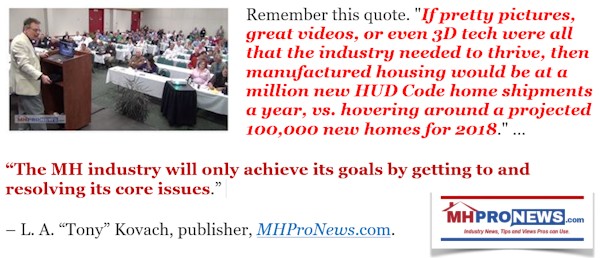
It is often the outsider looking in that can identify a problem, and point out whatever is needed to fix performance outcomes. See the graphic posted below.

Home shoppers may or may not think, ‘I want answers to such and such questions.’ But consciously or not, that’s exactly what well qualified buyers want.
The numbers of lost sales per location is often staggering.
Lost sales are often in the millions of dollars at retail a year, per location.
Take that outcome, and multiply it by the numbers or sales centers and communities, and it costs manufactured homes sellers collectively billions a year.
Investing in People and Processes Pays
Rephrased, investing in the correct marketing and sales pays off in fairly short order.
Let me refine that point. Clayton, Cavco or the new Skyline-Champion could be selling billions of dollars a year in more product, if they were willing to make ethical changes.
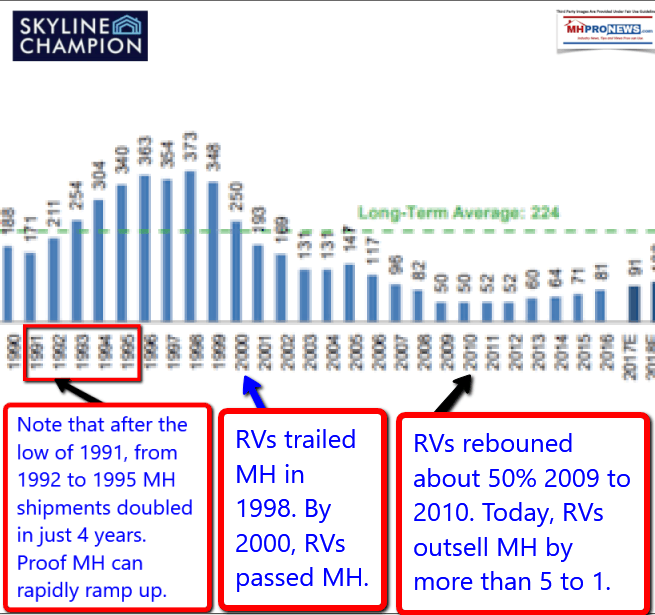
That also means that smaller independents – given the right approach coupled with discipline – could grow their results, and over time, challenge the larger players.
As a-near-closing note, the impacts above apply similarly for sellers of modular homes.
There’s power and profits from factually-based marketing and sales.
Despite all the hoopla and drama, there are factual reasons why we are the most read trade media, and perhaps the most endorsed/recommended professional in all of manufactured housing. That’s not bragging, those are facts.
Ready to invest in common sense change, and grow?
Check your budget for consulting, marketing, training, and recruiting. Then, give me a call or send a message. For those willing to make adjustments and stick with them in marketing and selling, the increased profit potential is nothing to sneeze at. ## (Manufactured housing related marketing & sales news, analysis, and commentary.)
(Third-party images and content are provided under fair use guidelines.)
 By L.A. “Tony” Kovach – Masthead commentary, for MHProNews.com.
By L.A. “Tony” Kovach – Masthead commentary, for MHProNews.com.
Tony is the multiple award-winning managing member of LifeStyle Factory Homes, LLC, the parent company to MHProNews, and MHLivingNews.com.
Office 863-213-4090 |Connect on LinkedIn:
http://www.linkedin.com/in/latonykovach
Click here to sign up in 5 seconds for the manufactured home industry’s leading – and still growing – emailed headline news updates.
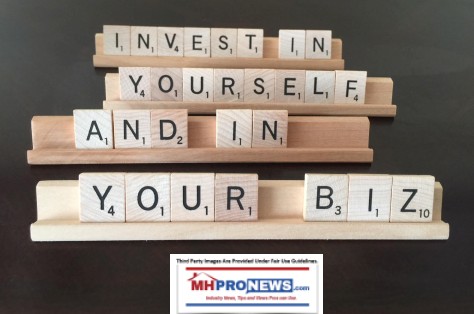
Related References:
Becoming a Standout Performer, Monday Morning Sales, Marketing Meeting

